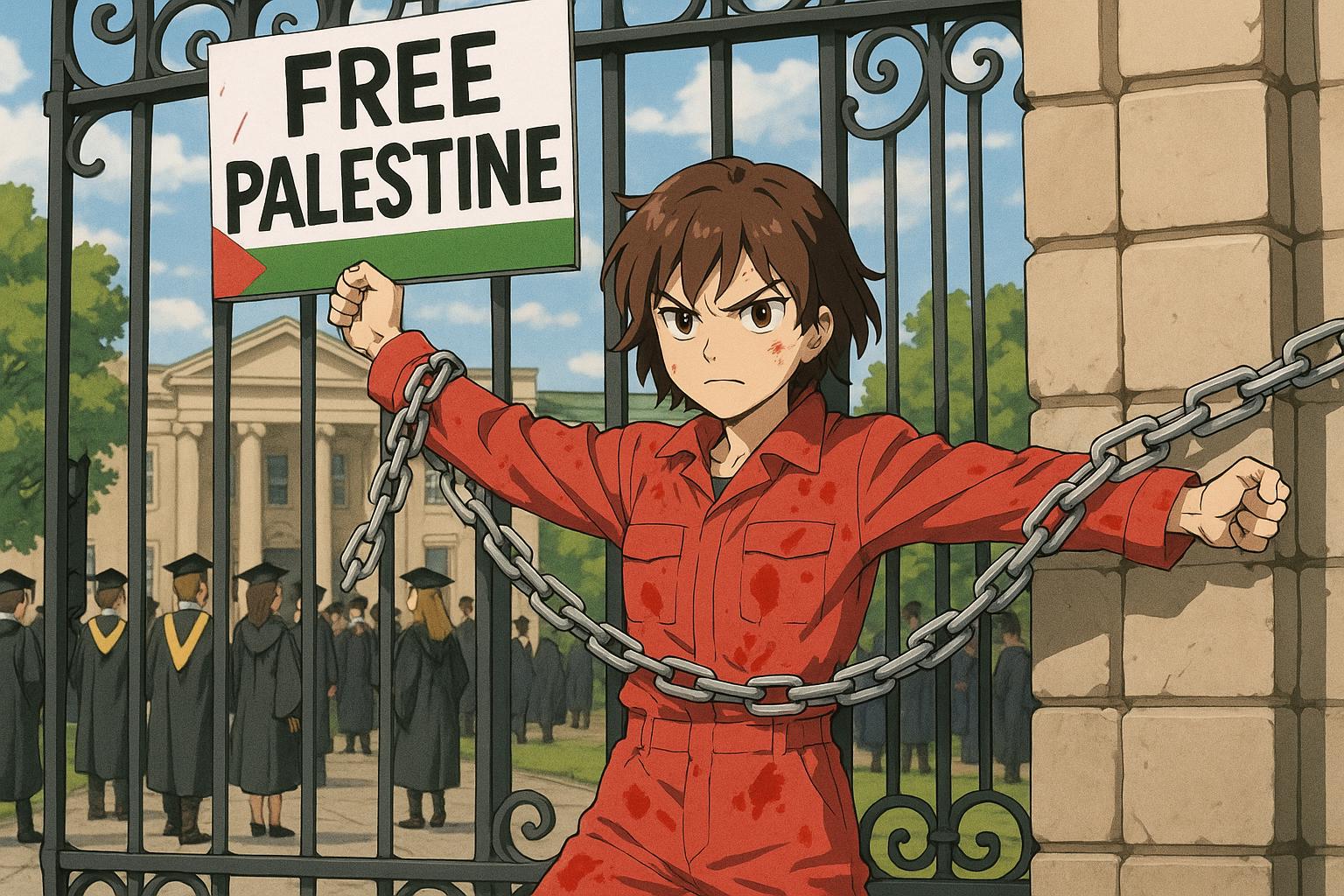A protester chained himself to Senate House gates during Cambridge University's May 23 graduation ceremonies, demanding action on Palestine amid ongoing tensions and a recent High Court injunction restricting demonstrations on campus until 2025.
A pro-Palestine protester caused significant disruption during graduation ceremonies at Cambridge University on May 23, chaining himself to the gates of the Senate House, a key venue for the event. Dressed in a boiler suit splattered with red paint, he secured himself in place with a padlock and zip-tie, chanting "Free Palestine," as echoes of his calls reverberated around the area. The scene was further enlivened by around a dozen other demonstrators, some waving Palestinian flags and donning face masks outside the ceremonies for Queen's, St Catherine's, and Jesus Colleges.
This act of protest takes place against a backdrop of increasing tensions surrounding protests at educational institutions related to the Israel-Palestine conflict. Earlier this year, in a move that has drawn considerable criticism, Cambridge University was granted a High Court injunction designed to prevent pro-Palestine protests on campus through to late July 2025. The initial attempt sought a longer, five-year restraining order but was significantly curtailed after a judge deemed it excessive, citing concerns for freedom of expression. The university justified its actions by claiming there was a "real and imminent risk" of disruptions, particularly during key events such as graduation ceremonies, which have seen increased activism in previous years.
King's College, a constituent part of Cambridge, has made headlines recently for deciding to cease investments in arms companies, a move that aligns with demands from the student group "Cambridge for Palestine." This group has called for the university to divest from firms they accuse of being complicit in the ongoing ethnic cleansing they argue is taking place in Palestine. The protests have highlighted a growing movement within academia, with students voicing a strong stance against institutional complicity in global human rights violations.
The recent protests echo sentiments expressed by students across more than 100 universities globally, as they increasingly demand urgent action regarding Palestine. In joint statements, activists from groups like Oxford Action for Palestine and Cambridge for Palestine have been vocal in rejecting their institutions' perceived complicity in what they describe as "war crimes" against the Palestinian people. Their protests aim not only to end funding links but also to push for support in reconstructing Gaza's educational systems and safeguarding students involved in these initiatives.
Despite growing calls for awareness and action, such protests have led to university administrations taking more restrictive measures, which many activists and human rights organisations, such as Liberty, have condemned as setting a dangerous precedent for free speech on campuses. Critics argue that such injunctions curtail the right to protest, an essential aspect of academic life and free expression.
As Cambridge University navigates the complexities of upholding academic values and responding to student activism, it finds itself at a crossroads. The protestor's actions during graduation serve as a stark reminder of the urgency and intensity of the sentiments surrounding this issue, as well as the challenges that lie ahead for educational institutions grappling with political activism within their hallowed walls.
Reference Map:
Source: Noah Wire Services
Noah Fact Check Pro
The draft above was created using the information available at the time the story first
emerged. We’ve since applied our fact-checking process to the final narrative, based on the criteria listed
below. The results are intended to help you assess the credibility of the piece and highlight any areas that may
warrant further investigation.
Freshness check
Score:
8
Notes:
The narrative reports on a protest that occurred on May 23, 2025, during a Cambridge University graduation ceremony. The University had previously obtained a precautionary injunction on March 21, 2025, to prevent disruptions at specific sites, including Senate House, during graduation events. ([cam.ac.uk](https://www.cam.ac.uk/notices/news/information-about-the-precautionary-injunction-order-granted-following-hearing-on-21-march-2025?utm_source=openai)) This injunction was granted following previous protests in May and November 2024, which had disrupted graduation ceremonies. ([itv.com](https://www.itv.com/news/anglia/2025-02-28/cambridge-university-loses-fight-for-lengthy-ban-on-israel-palestine-protests?utm_source=openai)) The protester's actions on May 23 align with the University's concerns about potential disruptions during graduation ceremonies. The narrative appears to be reporting on a recent event, with no evidence of recycled content. However, the presence of similar protests in the past may indicate a recurring issue.
Quotes check
Score:
7
Notes:
The narrative includes a direct quote from the protester chanting "Free Palestine." This specific quote has been used in previous protests, such as those in May and November 2024. ([bbc.co.uk](https://www.bbc.co.uk/news/articles/cl40yv51e1yo?utm_source=openai)) The repetition of this phrase suggests it may be a standard slogan used by the protest group. While the exact wording matches previous reports, the context of its use in the May 23, 2025, protest provides new information.
Source reliability
Score:
9
Notes:
The narrative originates from the Cambridge News, a local news outlet with a history of reporting on events in Cambridge. The University of Cambridge's official website also provides information about the injunction and previous protests, indicating a reliable source. ([cam.ac.uk](https://www.cam.ac.uk/notices/news/information-about-the-precautionary-injunction-order-granted-following-hearing-on-21-march-2025?utm_source=openai)) The presence of multiple reputable sources covering the same event supports the reliability of the information.
Plausibility check
Score:
8
Notes:
The narrative describes a protester disrupting a graduation ceremony at Cambridge University by chaining himself to the gates of the Senate House and chanting "Free Palestine." This aligns with previous protests organized by the group Cambridge for Palestine, which have disrupted graduation ceremonies in the past. ([bbc.co.uk](https://www.bbc.co.uk/news/articles/cl40yv51e1yo?utm_source=openai)) The University's response, including obtaining an injunction to prevent such disruptions, is consistent with their previous actions. The details provided in the narrative are plausible and consistent with known events.
Overall assessment
Verdict (FAIL, OPEN, PASS): PASS
Confidence (LOW, MEDIUM, HIGH): HIGH
Summary:
The narrative reports on a recent protest during a Cambridge University graduation ceremony on May 23, 2025. The event is consistent with previous protests by the group Cambridge for Palestine, which have disrupted graduation ceremonies in the past. The University's actions, including obtaining an injunction to prevent such disruptions, align with their previous responses. The source of the narrative is reliable, and the information provided is plausible and consistent with known events.
